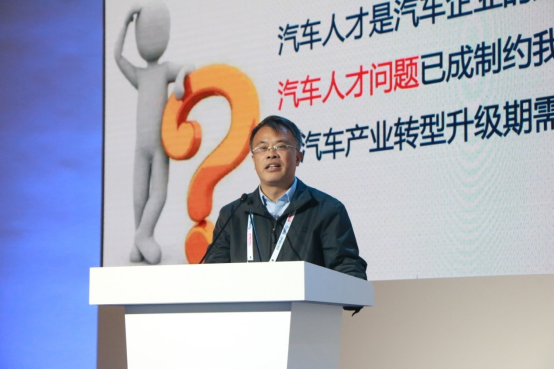Yu Zhuoping: State-owned enterprise talent incentive system does not match market development
Under the strategy of building a strong national automobile, the problem of talent team building is also a matter of concern.
Industry experts generally believe that new energy vehicles and intelligent network-linked vehicles are expected to become breakthroughs in seizing opportunities and catching up with the development. The auto industry will enter a transition period. Professor Yu Zhuoping, an assistant to the president of Tongji University, pointed out in the high-level forum of “China's Auto Power and Low Carbon Development†annual meeting of the China Association of Automobile Engineers 2017 that talent is now a major bottleneck restricting the development of the auto industry.
Yu Zhuoping concluded that in the face of new transitional changes, automotive talent faces challenges both in quantity and quality. In addition, the issue of talent flow and mechanism in the auto industry and the internationalization of talents are also receiving much attention.

Question one: The gap in talents for new energy vehicles
According to the 2016 “China Automotive Industry Yearbook†data, the total number of automotive employees has grown to 3.6 million in total, but less than 500,000 technicians are employed. From a percentage perspective, less than 15% of automotive technicians are employed. . In contrast, the proportion of technical talents in the automotive industry in developed countries often exceeds 30%.
In addition, the number of talented people in the field of energy-saving and new energy vehicles is 170,000, and 850 people will be required to reach 850,000. The current gap is 680,000. In 2025, it will require 1.5 million people, and the gap will be close to 1 million. "How to deal with the problem of the number of talents is the biggest challenge we face." Yu Zhuoping said.
Question 2: Unreasonable quality and structure of human resources
The development of automobiles is no longer a vehicle in the traditional sense, but is a large-scale mobile intelligent terminal, energy storage unit, and digital space. This poses a challenge to the quality of talented people and the talent structure of automobiles.
Professor Yu Zhuoping pointed out: "Now we still use the automobile as a subject of mechanical engineering, and vehicle engineering cannot even be a two-level subject, and 90% of the automotive professionals trained in this way go to the automotive industry." This means that Some new subject knowledge is reflected in the training of automotive talent and will become the second challenge.
Question 3: Reasonable Talent Flow Reasonable Enterprises “Break malicious people†One after another
It is understood that some time ago there was a phenomenon of malicious digging of a fuel cell company, causing the entire industry to reflect on. With the rapid development of the automotive industry, the demand for high-level talents is huge, making the competition for talent between enterprises intensify.
The second issue is the talent mechanism. Yu Zhuoping pointed out that state-owned enterprises do not match the development of the entire market in the talent incentive system. “For example, the salary-restricted system does not have many advantages in the talent cultivation in such a highly competitive market.†Yu Zhuoping stressed that such a mechanism does not exert the role of market allocation of talents, and leading talents and high-end talents cannot lead in. Can not stay in the introduction.

Question 4: The "Belt and Road" International Talent Challenge
With the "Belt and Road Initiative" proposed, auto companies will accelerate the internationalization of international talent has become the darling of major car companies. At present, the number of international talents owned by the company is insufficient, there are few international technology and management talents capable of going overseas, and there is a shortage of high-level auto talent with cross-cultural and national capabilities.
Yu Zhuoping introduced that when formulating energy-saving and new-energy automobile technology roadmaps, China has made predictions about the future automobile market: China will have an annual production of more than 40 million vehicles by 2030, and it will also be necessary for cars to go abroad. As a result, we must consider the cultivation of international automotive talent.
Breakthrough: Cultivating New Generations of Automotive Professionals
Faced with the plight of the four major talents in the auto industry, Yu Zhuoping put forward his own thinking. "From the perspective of quantitative development, we hope that by 2030 or so, technical personnel can reach the 30% level of developed countries." Prof. Yu Zhuoping stressed that the future automobile industry needs to train talents of multiple levels and types, including professional skills and talents. R & D personnel training.
“Every new automotive technology in foreign countries will conduct detailed market research to determine whether the technology can be adopted on the new generation of vehicles.†Yu Zhuoping’s concern is that China now places R&D talent in the marketing discipline group. This is very unmatched for the car's R&D process.
From the structural point of view, Yu Zhuoping proposed a cross-discipline, multidisciplinary fusion concept. Not only do the collaborative innovation of internal automobile talent training in universities, but also the cooperation between schools and enterprises, schools and schools. "If we do not integrate the knowledge structure, it will be difficult for us to achieve a breakthrough in the quality of our talent."
On the talent mobility mechanism, Yu Zhuoping put forward two suggestions: First, aiming at the “malicious digging of people†phenomenon in the industry, achieve standardized resignation and increase “competition limitsâ€; secondly, enterprises should rationally improve high-end talents in light of the problem of salary reduction for state-owned enterprises. The employment system matches the entire automotive market. "The auto industry is not a monopoly industry after all, nor a policy-protected industry."
In terms of international talent training, Yu Zhuoping pointed out that colleges and universities should give overseas talents a channel to train and obtain both domestic and international degrees. "This type of talent will undoubtedly lay a good foundation for internationalization." Prof. Yu Zhuoping also pointed out that the cultivation of talent is a lifelong system. From universities to enterprises, it is still necessary to continue training. Enterprises should give talents a variety of training conditions. In addition, talent introduction is an important channel for high-end talents.
Non Standard Parts,Non Standard Fittings,Metric Male Hydraulic Fitting,Carbon Steel Female Fitting
Jiaxing Master Fitting CO.,LTD , https://www.jiaxingmaster.com